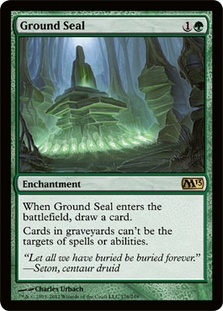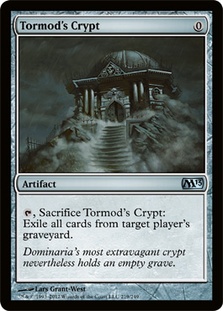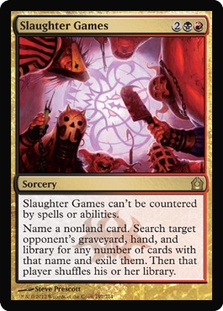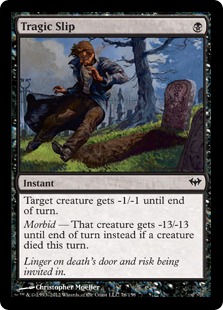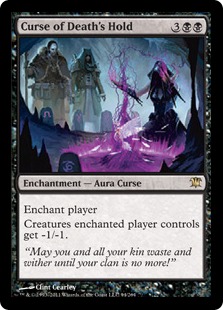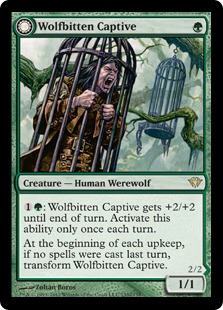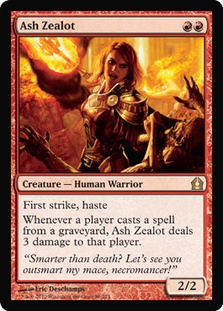Keeping Up with Standard
The results from Grand Prix Quebec City and the 10K side event at Grand Prix Charlotte leave Standard in an interesting place. Basically, they make a compelling case for Jund as the best deck with Reanimator serving as a foil. This is a huge oversimplification, but let me explain where I’m coming from before getting into the complicated details.
At Pro Tour Gatecrash, Owen Turtenwald made Top 8 with Jund (and lost because of forgetting about Garruk’s fight ability more than because his deck failed him), and I believe Reid Duke finished 8-2 in Standard with it. The next week, Owen lost in the finals of the 10K, and Reid lost in the semifinals of GP Quebec City, both with mostly the same deck. Arbor Jund put another player in the Top 8 and three more in the Top 16 in Quebec City. As far as I know, the deck just has an insane win percentage.
However, Reanimator won the 10K, and Human Reanimator lost in the finals of the Grand Prix, making it the next big thing. It appears to be a convincing favorite against Jund and Jund’s worst matchup by a considerable margin.
But there’s a catch.
Reanimator is good against the old Jund lists, but the problem with Reanimator is that it can never be good if people want to beat it. Jund has access to plenty of graveyard hate if it wants it. In testing, Reid played a Ground Seal main, and it might be time for it to make a comeback, possibly with some Tormod’s Crypts or Slaughter Games (most likely Slaughter Games).
So if you’re looking at playing Reanimator to beat Jund, the question is will you even want to play against most Jund players or can you expect them to have enough hate that they actually become the matchup you’re hoping to dodge? This gets us into the usual sideboard metagame. Everyone knows that everyone knows Reanimator can be easily hated out, so no one can play Reanimator, but if no one can play Reanimator, then no one needs to actually put the hate in their deck, but if no one includes the hate…
Realistically, I think some people are going to play Reanimator and some people are going to keep them honest. I know that I personally would be on level 0—I wouldn’t play Reanimator and would have some hate, but I wouldn’t go crazy with it.
If Reanimator can’t be trusted to keep Jund in check, what else beats Jund? That’s the real question of the format (and to some extent Magic in general these days). I’ve been somewhat satisfied with The Aristocrats’ matchup against Jund, but a lot of it depends on their access to cards like Tragic Slip and Curse of Death’s Hold. (Jund never had these cards before, but some people seem to want them now, although I don’t think Jund will have room for them while respecting Reanimator, especially with only one Aristocrats player in the Top 8 in Quebec.) Still, I’d hardly recommend it as the perfect foil to Jund; it’s just a deck that can compete. Really, that might be what we’re looking at in general.
What else is going on in Standard?
Control may or may not be a big thing. There was a lot of it in Charlotte—some Bant, Esper, and quite a bit of U/W/R—and almost none at the top in Quebec. Why? I really don’t know.
Aggro! Aggro’s definitely a thing. There wasn’t as much at the 10K, but it was all over the place in Quebec, including the deck that won the Grand Prix.
Nico Christiansen won GP Quebec City with:
Creatures (33)
- 4 Champion of the Parish
- 4 Mayor of Avabruck
- 4 Lightning Mauler
- 4 Flinthoof Boar
- 4 Boros Elite
- 4 Burning-Tree Emissary
- 4 Experiment One
- 4 Frontline Medic
- 1 Ghor-Clan Rampager
Lands (20)
Spells (7)
Sideboard

I like this deck in general. It does some extremely powerful things. We tested a deck like it from Magic Online before the Pro Tour, and I like some of the changes here. Giant Growth seems pretty sweet—I think I like it—and it’s taken the place of more Ghor-Clan Rampagers. Searing Spear over Boros Charm makes some sense. It’s more flexible and easier to cast.
I haven’t been too impressed by Experiment One. If you’re interested in this deck, you should definitely test Wolfbitten Captive in that slot. The removal of most of the Rampagers makes Experiment One slightly worse.
I’m not sure if Flinthoof Boar is better than Ash Zealot. It might be, but it’s not a Human and there are only eight Mountains in this deck. On the other hand, if you can cast Ash Zealot, you probably have a Mountain since there are only five other red sources (unless you’re playing it on turn 3 and using a Burning-Tree Emissary to fix your double green into a red). Experiment One definitely prefers Flinthoof Boar, but if you cut it for Captive, then that’s not a factor.
20 lands might not be enough to really satisfy this deck’s color requirements, but it did survive a pretty long GP, so I guess it might be fine.
The biggest weakness of this deck in my testing was a bad U/W/R matchup, which makes it not too surprising that this deck won the event that had only one such deck in the Top 16 rather than the event that was full of them. Whether Naya Blitz will be a good choice in the future largely depends on which tournament you think the metagame you’ll face will most closely resemble.
For the most part, I feel like there are a lot of decks in Standard that all have pretty similar matchups against each other. I think it’s a good time to play what you like and what you know, but I believe we’re at the point where Arbor Jund should be considered Public Enemy #1.
Now, changing gears completely.
The Role of Pros
Huge Grand Prix clearly demonstrate that Magic is doing extremely well, but they cause a lot of logistical problems for the players involved. As such, Grand Prix Charlotte has generated a fair amount of discussion on Twitter.
Grand Prix Charlotte happened at a time when some pros were complaining about the bad "expected value" of Grand Prix anyway, which this tournament then perfectly highlighted.
I don’t have any great suggestions for fixing extremely difficult logistical concerns, and I know that the question of whether to add prizes to compensate for increased difficulty is complicated. Increasing prizes because attendance is too high doesn’t actually make sense since it’s been clearly demonstrated that people are willing to play when the prize pool is smaller, so it takes a lot to convince a business that it’s worth spending more.
What I’m interested in is a tangential discussion that I saw on Twitter.
People said that going to every Grand Prix is too expensive and time consuming and that the rewards are too low. Going to a Grand Prix is fun if you’re looking for a rare chance to participate in a giant tournament, but the novelty wears off when you’re doing it for the third time in a month for the third month in a row, so a lot of pros are losing interest in attending Grand Prix. The problem is that the Pro Point system makes skipping Grand Prix extremely damaging to a professional Magic career because it’s hard to maintain levels in the Pro Players Club without attending Grand Prix, so you have players feeling forced to attend events they’re not that happy to be at.
This led to a discussion about how much Wizards of the Coast should care and how important pro attendance is to Grand Prix, complete with a series of tweets discussing how many extra people attend Grand Prix because they expect to see Luis Scott-Vargas there.
This entire discussion completely missed the point.
The people WotC cares about aren’t the people who want to meet LSV; they’re the people who want to be LSV.
I’m not saying every player at a Grand Prix is trying to become a professional Magic player. I know that’s far from true, but let me explain.
When I ran a game store (which I did for a few years), the idea of "alpha gamers" or "alpha customers" came up. These are the people you really care about acquiring as customers. They’re people who have a group of friends who they are likely to bring with them who will also become your customers.
I went to college in Beloit, Wisconsin at Beloit College. Beloit had a campus of around 1,200 students, and approximately 10% of them were in the gaming/sci-fi club. When I got there, there were a couple people who sometimes played Magic with cards they’d had for five+ years. After I was there for a few years, I had some friends who drafted several times a day on Magic Online, and I organized several drafts a week in person. As far as I know, after I left, the college went back to just having a few casual players.
Very dedicated players drive Magic sales, not just because they buy more cards to support their greater involvement in the game, but because they make others play a lot more than they would otherwise. Pro Tour hopefuls try to build a community around them to test for PTQs and encourage their friends to go with them to events. I’m guessing a huge number of players at Grand Prix Charlotte wouldn’t have been there if they didn’t have friends who were more motivated than they were dragging them along.
The Pro Tour does some great things in terms of introducing players to new ideas that might inspire them to buy new cards to try new decks, but at its heart, I believe the Pro Tour is about selling a dream.
The point is to give players something to work toward so they can feel like everything they invest in Magic is actually working toward a higher goal, unlike most other games they could be playing instead.
I know it worked on me.
I saw a tweet that claimed that Magic is marketed as a game, not as a career, and that Wizards shouldn’t be concerned with supporting people who try to make it a career.
I strongly disagree.
Thousands of young players look to the most successful players in the game to see what kind of lifestyle Magic can offer if they decide to try to take it seriously. If they see tweets about how awesome life as a Magic player is, they’re a lot more likely to want to try to live that life themselves than they are if they see a lot of tweets complaining about how hard the grind is and how frustrating large tournaments are.
There is still a serious question about what kind of life they should be trying to market though.
Specifically, I have very different concerns from people like Brian Kibler, Tom Martell, Gaudenis Vidugiris, and most other pros. I make my living entirely through Magic and writing, whereas they play Magic on the side while maintaining other full-time jobs. They want Pro Points to come primarily from Pro Tours so that they can get by playing in very few Grand Prix in order to have time for other things in their lives while still getting to play in the most fun and profitable tournaments.
I want to have tournaments to play in very often, and I want them to be important enough to let me justify flying all over the world to play in them because I like that I get to play Magic and see the world. (Tomorrow morning I’m leaving New York, where I’ve been for the last two days, to fly to Tokyo, and then on Monday I’m flying to Italy before heading to Amsterdam the next week.) I want Pro Points to be spread out across as many events as possible so that I don’t have to worry about losing my job if I do badly in a handful of events, as many top players have in the past.
WotC has to decide which dream they’re trying to sell people (either the dream of being able to play on the Pro Tour while leading a normal life or the dream of supporting oneself entirely off Magic) or find a way to fully support both kinds of players.
Either way, I strongly believe (acknowledging that I’m extremely biased but also extremely well informed as someone deeply entrenched) that the solution isn’t to just say, "We don’t need pros to fill events anymore; we have enough new players and should focus our attention on them." Magic thrives based on the seriously committed players, and those players care about what professional Magic has to offer, even if they don’t care about any of the professional players directly.
There are a ton of related questions we could get into, like the ethics of selling people on a dream that such a small portion of players realize (it shouldn’t shock you that I have no problem with this) and how much people care about meeting pros (my experience tells me that there are definitely people who are very happy to meet us—thanks for the feedback, it’s always a pleasure!), but I don’t think that’s what’s most important here.
I think a lot of players fear for the future of the Pro Tour and the sustainability of the lifestyle because they don’t understand why Wizards should support it. I don’t have those fears since I believe Wizards has consistently demonstrated that they understand the ideas I’ve outlined here through their actions and don’t see why any of that would change. I’m optimistic that they’ll find ways to make things better for everyone in the near future.
Thanks for reading,
Sam
@samuelhblack on Twitter

